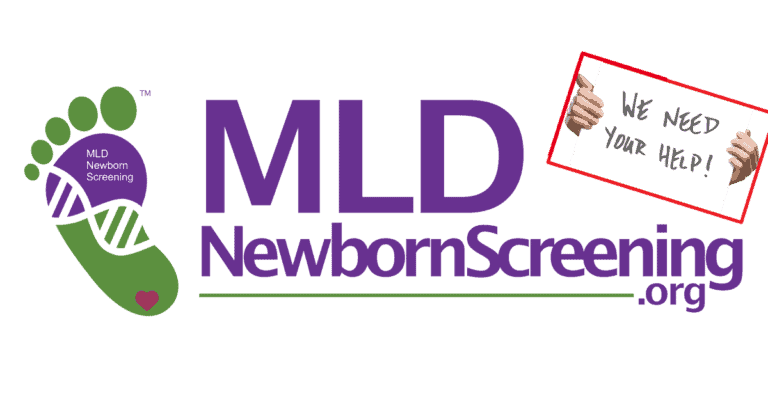The May 20th, 2020 launch meeting has concluded. We had participants join from Australia to Europe, Canada to Argentina and all across the United States. You may view the video below. Written details of the RANSIP program, organization, EAG member bios, and the Focus Working Groups can be found on the RUSP Nomination page.
Register to receive future meeting invitations.
Be sure to register so you don’t miss our next interactive meeting.
Please join us for an overview and introduction to the MLD RUSP Approval and Newborn Screening Implementation Program (RANSIP)
During the interactive ZOOM meeting, you will learn:
- Expert Advisory Group – The role and current activities of the EAG
- Clinical Care – How to get involved to optimize MLD NBS, clinical care, therapeutic referral, and other processes by joining or contributing to the seven MLD NBS Working Focus Groups
- State Implementation – We need you to get involved to implement MLD NBS in the 56 US public health systems (50 states, 5 territories, and the military)
- Global Implementation – We need your help to implement MLD NBS in Europe and the rest of the world
- Q & A and discussion – there will be plenty of time for discussion

Facebook
Twitter

Hello all,
Our son AJ was diagnosed with late-infantile MLD when he was 2.5 years old. He will be 4 in October. Since his diagnosis, his decline has been substantial and devastating to watch. I feel it is incumbent upon me to give my opinion on the notion of newborn screening. Again, this is my opinion and specific to our particular situation and I apologize if I offend anyone. I can’t speak to juvenile or adult onset obviously.
It seems like an eternity ago since AJ was diagnosed. Up until that time, I had no idea he had such an awful disease that will eventually take him at such a young age. I definitely had some angst in the pit of my stomach when he could never run or jump, but I never thought he had a terminal disease. I have to say that I am glad that we had no idea that he was terminal for the first 2.5 years of his life. Given there is no cure, knowing would have altered our life and time with him for the worse. We would not have been able to enjoy everything to the fullest like we have, even though it was blissful ignorance. Had we known from birth or early infancy, we could have very likely entertained the idea of BMT or experimental gene therapy. But to what end? There is no cure. His fate would have still ended up like all late-infantile MLD kids do, which is horrible. I have been told by a specialist as well that even if a BMT or gene therapy “works”, MLD still affects the peripheral nervous system. Patients will still end up bedridden, unable to move, potentially unable to breathe, and for a longer period of time than they otherwise would have. My wife and I would define that as a very poor quality of life. Except now with successful BMT or gene therapy, the child is cognitively intact. So now, you have maintained awareness and consciousness in a child who will now more fully appreciate just how much they can’t do.
We had our 2nd child, who is now 15 months, before we found out that AJ had MLD. Thankfully our youngest tested negative. I guess my larger message and opinion, for us, is that we don’t want to keep our son on this Earth in a debilitated state just for our sake. We personally wouldn’t want that for ourselves. We don’t want to keep him from God by trying life-threatening radical therapies that could most certainly cause more harm than good. Now, if there was a cure, then hey, a BMT or gene therapy may be worth the risk. I realize that insight about this disease has to take place by studying how patients respond to different therapies at different points in the disease process. However, for late-infantile MLD, we are against newborn screening.
Thank you for listening and hopefully one day there will be a cure.
Wayne